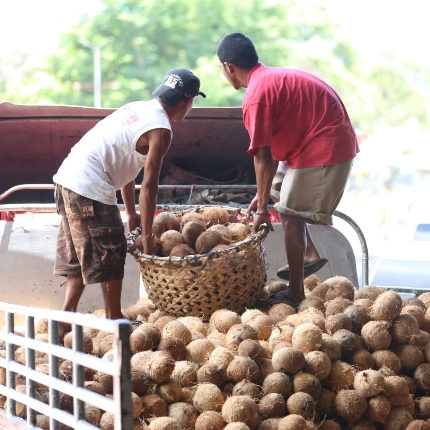Fair Trade USA™
Impact Management System
How Do We Measure Impact?
The Impact Management System (IMS) is Fair Trade USA’s approach to defining, measuring, and communicating the impact of our model. The foundation of the IMS is the organization’s Theory of Change, which describes the vision of how the Fair Trade programs catalyze change in the lives of people around the globe.
The IMS also includes the indicators, processes, and technologies used to monitor and evaluate its programs and report on progress toward achieving its outcomes over time.
The objectives of the IMS are:
- Define the outcomes and impact that Fair Trade USA aims to achieve and the methodology for measuring Fair Trade practices
- Evaluate the effectiveness of program strategies and activities (e.g. standards, market support, consumer activation programs) in realizing goals and desired outcomes
- Use internal and external evaluations to refine Fair Trade USA’s programs and improve results
- Communicate the change Fair Trade USA is enabling for producers, communities, businesses, and consumers

How does Fair Trade USA create change?
Our impact for producers results from two primary mechanisms:
Implementing Fair Trade Standards
Our Fair Trade USA standards drive Certificate Holders (farms, factories, fisheries, and cooperatives that hold a Fair Trade Certificate) to operate ethically and fairly. These standards are designed to protect the livelihoods of those who produce goods by requiring decent and safe working conditions, supporting economic well-being, advocating for gender equity, and protecting human rights.
Investing Community Development Funds
For every Fair Trade Certified™ product sold, the business or importer pays an additional sum of money above the purchase price that’s then returned to the producer community in the form of Community Development Funds. Each producer community democratically votes on the administration of these funds, supporting empowerment and agency over the impact on their communities and livelihoods.
Ultimately, these strategies are shifting global systems of inequity.
Outcomes and Key Performance Indicators
In order to achieve impact goals and measure the success of Fair Trade practices, we ensured our Theory of Change clearly defined our outcomes and assigned a suite of key performance indicators (KPIs), or a quantifiable measure used to evaluate the success of meeting an objective.
Here are some sample objectives:
- Community Organization
- Increased Education
- Individual Empowerment
- Safe and Secure Workplaces

Program Measurement Approach

At Fair Trade USA, our commitment to measuring Fair Trade practices is demonstrated through our comprehensive monitoring and evaluation approach. We utilize a diverse array of methods and tools to gather data and assess the outputs, outcomes, and impact of our programs. We collect sampled data across a selected group of producer organizations, consumers and businesses, preferably a representative sample. Where appropriate, these results can be extrapolated to draw conclusions at an organizational level. We also occasionally perform in-depth studies to deepen our knowledge on a specific topic or for a carefully chosen subset of program participants.
The Fair Trade Impact Management System
We help businesses deliver on their sustainability goals.
Impact Management System (IMS)
Learn more about our Impact Management System in detail.
Theory of Change
The foundation of the IMS, it describes how the Fair Trade programs change the lives of people around the globe.
You can also learn more about our IMS development & Revision Procedure, Research Agenda, and Consultation Summary.